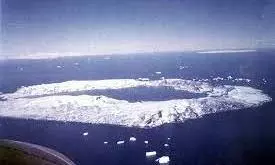
Antarctic volcano offers insights into Mars's potential for life
text_fieldsDeception Island, located in the South Shetland Islands of Antarctica, provides scientists with valuable insights into the potential for life on Mars due to its unique combination of an active volcano and extreme environmental conditions.
The horseshoe-shaped island is distinctive as it is the only place globally where ships can navigate into the caldera of an active volcano.
A caldera is a sizable crater that develops when a volcano erupts and crumbles. In the course of a volcanic eruption, the magma within the underlying magma chamber is expelled, typically with great force. As the magma chamber empties, the structural support previously provided by the magma is no longer present.
The ecosystem surrounding the volcano, with steam rising from beaches and glaciers contrasting with the black slopes, hosts various life forms, including fish, krill, anemones, sea sponges, chinstrap penguins, seabirds, seals, and sea lions.
Despite enduring active volcanic eruptions, such as those in 1967, 1969, and 1970, which led to the devastation of British and Chilean bases and the evacuation of an Argentine base, life consistently returns to the island.
The island's water temperatures in steam vents, or fumaroles, can reach around 70 degrees Celsius (158 degrees Fahrenheit), while air temperatures can plummet to -28 degrees. Spanish planetary geologist Miguel de Pablo likened the conditions on Deception Island to Mars, stating, "It is the best possible approximation that we can make to understand Mars without stepping on" the planet.
The analysis of rocks on Deception Island complements the broader study of Mars, contributing to scientists' understanding of the planet's past climate and potential for life. The island's harsh conditions parallel the current state of Mars, making it a valuable proxy for scientific investigations.
The findings on Mars, including evidence of cyclical seasons conducive to life, have been gathered by rovers such as Curiosity and Perseverance.
While Deception Island holds scientific significance, it also has a rich history, including past exploitation for whaling and sealing.
The South Shetland Islands are subject to the Antarctic Treaty, emphasising the use of the region for peaceful purposes and freedom of scientific investigation. The island, now dedicated to scientific research, attracts thousands of tourists on cruises, prompting concerns among scientists about the increasing impact on the fragile ecosystem.






















